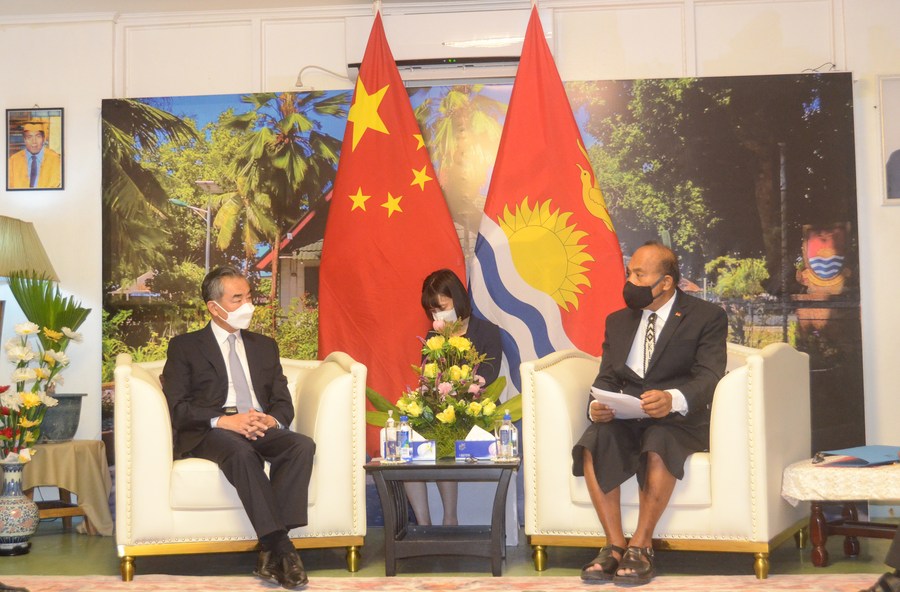Kiribati, China vow to enhance cooperation on BRI, climate change

Kiribati President and Foreign Minister Taneti Maamau (R) meets with visiting Chinese State Councilor and Foreign Minister Wang Yi in Tarawa, Kiribati, on May 27, 2022. (Xinhua)
Kiribati and China pledged to deepen cooperation in joint construction of the Belt and Road and synergize it with the Kiribati 20-year Vision, expand cooperation in various fields and focus on improving people's livelihood.
TARAWA, May 27 (Xinhua) -- Kiribati and China pledged here on Friday to enhance cooperation in building the Belt and Road, dealing with climate change and fighting the COVID-19 pandemic.
While meeting with visiting Chinese State Councilor and Foreign Minister Wang Yi, Kiribati President and Foreign Minister Taneti Maamau said the visit by the Chinese delegation brings mutual trust, friendship and cooperation, which bears milestone significance in the relations between Kiribati and China.
Since the resumption of diplomatic relations between the two countries in September 2019, the practical cooperation between the two sides has yielded fruitful results and the substantial improvement of the wellbeing of the Kiribati people has been witnessed, demonstrating China's sincerity, friendship and fulfilment of promises, the president said.
Kiribati unswervingly upholds the one-China principle and firmly supports China in building a community with a shared future for mankind, the president said.
Expressing gratitude to China for its help and assistance in dealing with the pandemic, economic development and infrastructure construction, the Kiribati president said his country is devoted to lifting the bilateral ties to a new high so as to bring more benefits to the Kiribati people.
Wang said China is not only the friend of Kiribati, but also the most reliable friend of all the developing countries.
China will firmly safeguard the rightful interests of the developing countries, especially the small and medium-sized countries on the international and multilateral arenas, he added.
Since the resumption of diplomatic ties between China and Kiribati more than two years ago, the two sides have witnessed the rapid development in bilateral ties with cooperation in all fields pushed forward, which has brought tangible benefits to the people of Kiribati, Wang said.
The two countries have trusted and supported each other, which has become a model of equal treatment between big and small nations, Wang said.
Facts have shown that Kiribati's decision to resume diplomatic ties with China is in the fundamental interests of the Kiribati people, Wang said.
Noting the world is still experiencing the pandemic, wars and poverty, Wang said the United States and its allies, however, are bent on containing the development of China. In essence they do not want to see the success of a non-Western force as well as strengthened solidarity and cooperation between the developing countries.
The development and revitalization of China and other developing countries are their legitimate rights. In this sense, the developing countries supporting China in safeguarding its core interests are actually supporting themselves. Similarly, China facilitating the economic development of the developing countries is actually helping itself, Wang said.
Both sides agreed to continue strengthening cooperation in fighting COVID-19. The first batch of the Chinese medical team arrived in Kiribati along with the Chinese delegation to help Kiribati fight the epidemic and provide medical services for the Kiribati people.
The two sides pledged to deepen cooperation in joint construction of the Belt and Road and synergize it with the Kiribati 20-year Vision, expand cooperation in various fields and focus on improving people's livelihood. They also vowed to give full play to Kiribati's advantages in resources and create new highlights in maritime cooperation on the premise of ecological protection.
The two sides are committed to carrying out cooperation in tackling climate change, and agreed that the developed countries should genuinely shoulder their historical responsibilities, fulfill their commitments on climate-change financing to the developing countries, and help the developing countries enhance their capacity building.
Wang stressed that China is firmly committed to a green and low-carbon development path and will help small island countries tackle climate change through South-South cooperation.
Following the meeting, the two sides attended a signing ceremony of cooperation documents including joint building of the Belt and Road, disaster prevention and reduction, infrastructure construction, tourism and people's livelihood.


